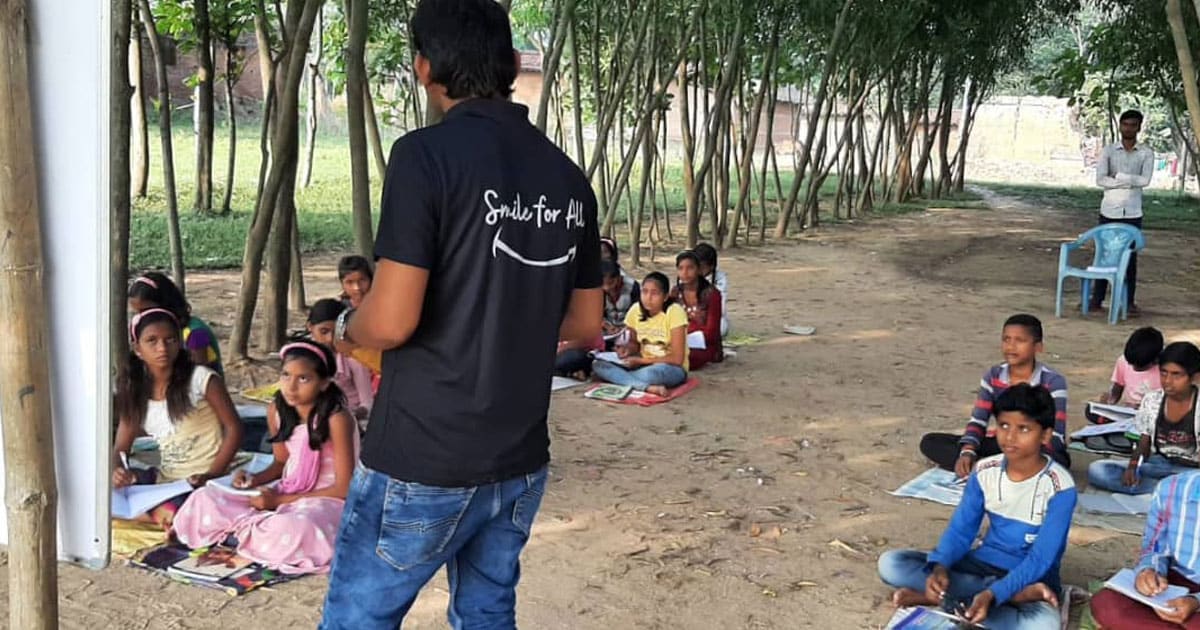With extreme poverty and lack of privilege, many people have never had formal education or dropped out in their earliest years of study. Instead, they had to rely on begging for a living.
Bhunesh Sharma, an ed-tech entrepreneur from Jaipur, saw a few kids at a traffic signal in 2015 from an underprivileged background.
They came up to him and pleaded for a pencil and paper through the car window. This odd request caught him off guard as most children on the street are there to sell things or ask for the money. Instead, they desired help in meeting their basic need for education.

Bhunesh claims he went to a neighboring stationery store and bought pencils for them right away. They were three children, two of which were four and eight years old. The other was a three-year-old girl who lived in a nearby slum. He contacted their parents to learn more about their circumstances and whether or not they were in school.
When he saw the kids needed help with their education, he volunteered to teach them for free. However, Bhunesh was simply a stranger who turned up at their home and offered to teach their children, so the parents declined. They were also concerned that he would lead them down a path of illicit activity.
But Bhunesh didn’t give up on his intent.
Throughout the next week, he attempted to convince their parents until they approved. They were hesitant to send their children to schools outside of their area. As a result, he informed the parents that he would make daily visits to the children and teach them at home, in which the parents could observe the sessions.
He was working at a startup at the moment and could only spare an hour a day to educate them. About seven parents contacted him after seeing his honest attempts and asked if he might educate their children. As the semester progressed, the number of pupils increased to 40 by 2017.
However, Bhunesh quickly realized that the children would thrive more if they went to school. A large number of them had dropped out. Due to a lack of documentation, the parents were unable to apply for admission to private schools under the Right To Educate (RTE) program. In many cases, the parents had no idea how to carry out the needed processes.
Also, read: On Weekends, These Inspiring Youths Selflessly Chose To Educate Street And Slum Kids
As a result, Bhunesh took out an Rs. 1.5 lakh loan to enroll the children in private schools and pay their tuition costs.
Bhunesh began recruiting volunteers as the number of children in his lessons grew. He enlisted the help of his wife, Neha. However, when the total reached 125, he realized that his finances were insufficient to support the children.
Bhunesh founded Smile For All Society (SFA) in 2019 to seek financial assistance. He began an OTT-like subscription plan two years later, in 2021, to get benefactors to support education for impoverished children.
The subscription service works in the same way as Netflix, Amazon, or Hotstar do. People who want to support children’s education can join up for a monthly subscription starting at Rs. 500. The money is spent effectively on the education of the children.
The subscriber gets a certificate that includes information on the student who will benefit from the funds. The subscription receives a monthly current performance appraisal report on the student. It contains academic reports, attendance records, and other information. The subscriber can make a phone call or visit with the student in person.
For every five students, one volunteer is assigned to observe and exchange information. 4,000 volunteers from India’s slums, including Kolkata, Jaipur, Mumbai, and Noida, have volunteered their time to teach kids from 100 slums.
Currently, the NGO has 612 subscribers who are financing the education of over 1,000 children in 250 places across India. There are 35 schools on board, including those in Jharkhand’s and Odisha’s remote tribal territories.
The NGO also assists in the fulfillment of documentary needs and the provision of study materials to the children.

